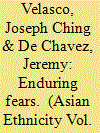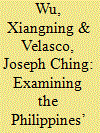| Srl | Item |
| 1 |
ID:
191777


|
|
|
|
|
| Summary/Abstract |
This paper examines enduring fears and anxieties about ‘Chineseness’ that widely and persistently circulate in the Philippine cultural imaginary. Chinese Filipinos have historically been implicated in a prejudicial politics of recognition within the Philippine postcolonial state, which has attempted to forge a national identity through problematic notions of ethnic and cultural purity. To undermine what Franz Fanon calls the pitfalls of national consciousness, scholars have often turned to concepts such as syncretism and hybridity, which celebrates heterogeneity and diversity as it opposes essentialism and purity. The agenda of this paper, however, is to examine the forces that generate obstacles to an affirmative politics of cultural assimilation and belonging. Toward that goal, we offer a symptomatic reading of the film Feng Shui (2004), which we suggest condenses anxieties about Chineseness that circulate in the Philippine cultural imaginary, anxieties that amplify difference and potentially undermine the reparative force of hybridity.
|
|
|
|
|
|
|
|
|
|
|
|
|
|
|
|
| 2 |
ID:
188430


|
|
|
|
|
| Summary/Abstract |
When great powers such as the United States and China grow especially hawkish with more uncertainties, how does a smaller state react to such a complex and dangerous territorial conflict? Given the competing frames of influence between China and the United States, what are the underlying reasons for the shift in the Philippines’ foreign policy? This paper focuses on the Philippines’ changing foreign policy on the South China Sea dispute and examines the main rationale for its shift in strategy towards China. We use the perspective of neoclassical realism to unpack the constraining factors that underlie the Philippines’ domestic politics and ongoing global exigencies. With changes in its domestic politics and the security challenges posed by the evolving geopolitics of the Indo-Pacific region, the Philippines is in a difficult situation, having to choose between a territorially hostile trading partner and its historical security guarantor.
|
|
|
|
|
|
|
|
|
|
|
|
|
|
|
|